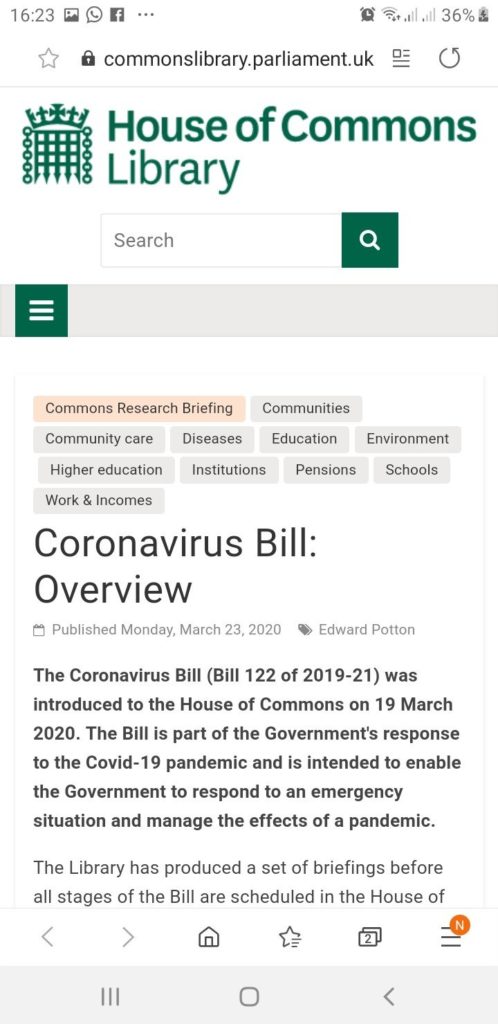
“Eliminate every likely possibility and what you are left with, no matter how unbelievable, is the answer to the question.”
What No Sh#t Sherlock Holmes Might Ask In Locked-Down Britain
If the famous fictional sleuth, Sherlock Holmes, was put in charge of investigating COVID, he might start by asking the following questions:
“Why was the first draft of the Coronavirus Act 2020 called “Bill 122 of 2019-21”, a number preceding those of bills announced in the Queen’s speech, at the opening of the first session of Parliament last December?
Why wasn’t it mentioned by any of the political parties in the election campaign?
Why won’t the government disclose the so-called science they repeatedly tell us they are relying upon to justify their Draconian measures of containment?
Are Parliament’s actions to criminalise our daily lives void and unlawful under constitutional law, under the following well-established doctrine?
Void Acts of Parliament
In the 1610 decision of Thomas Bonham v College of Physicians 8 Co Rep 107a; 77 Eng Rep 638, commonly known as Dr. Bonham’s Case, in the Court of Common Pleas before Coke, the learned judge ruled that:
“In many cases, the common law will control Acts of Parliament, and sometimes adjudge them to be utterly void: for when an Act of Parliament is against common right and reason, or repugnant, or impossible to be performed, the common law will control it and adjudge such an Act to be void.”
In breach of the common law, William Blackstone unlawfully crowned Parliament the sovereign law-maker, following the dismissal of Cokes ruling, preventing the common law courts from not only throwing aside but also reviewing statutes in the fashion Coke suggested they must.
Parliament Is a Legal Fiction & Cannot Be Sovereign
Parliamentary sovereignty then became the universally-accepted judicial doctrine in England and Wales, in breach of the common law, but the constitution affirms that the monarch represents the sovereignty of the people, by the consent of the majority.
However, that is always subject to the terms of the contractual arrangements set forth in Magna Carta, the Declaration of Rights, the Act of Settlement, the Petition of Right and the Coronation Oath.
Nevertheless, that the monarch, or a parliament which claims sovereignty, is still subject to the common law was reaffirmed in the supreme court’s unanimous decision of 2019, thereby unequivocally reinforcing and settling Cokes ruling, in R (on the application of Miller) (Appellant) v The Prime Minister (Respondent) Cherry and others (Respondents) v Advocate General for Scotland (Appellant) (Scotland).
Common Law Cannot Be Altered By Crown Prerogative
In accordance with Case of Proclamations (1611) 12 Co Rep 74, which held that an attempt to alter the law of the land by the use of the Crown’s prerogative powers was always unlawful and void.
The court concluded at p 76 that “the King hath no prerogative, but that which the law of the land allows him”, indicating that the limits of prerogative powers were set by law and were to be determined by the courts in accord with that binding precedent.
Ergo, if Parliament does have any lawful claim to exercise the sovereignty of the people, that cannot be exercised in breach of the common law, which guarantees the freedom, protections and sovereignty of the British people must remain in tact, irrespective of what befalls this ancient nation.”
Elementary Exosomes
Then Sherlock might well declare to his trusted friend and crime fighting partner. with his trademark intellectual panache and a puff on his pipe:
“Until we determine the answers to those critical questions, Watson, we will never be able to firmly establish why Britain has been abolished because of exosomes, the body’s natural defence to environmental toxins, which those in Whitehall appear to have mistaken for a ‘deadly virus’.
Which is no different to telling everyone they can’t go out because the dastardly Moriarty is on the loose, when in fact it is Sherlock Holmes, his very nemesis, going for his daily stroll around the prison yard, in the hope he doesn’t get arrested for clearing his throat in a public place.”
Inversion
To which Watson would almost certainly reply, with a wry smile:
“An inversion of both the law and reality then, Holmes, so to speak?
“Indubitably Watson, but for whose benefit and to what end?
Will we soon see the day in this country, when a gentleman can be arrested and charged with being on Baker Street, having had too much to think?
Because, Watson, as history teaches us, truth is the first casualty in any war, which gives rise to yet another question:
WHO is waging this war and against whom are they waging it?”





